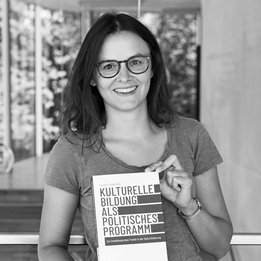Doctorate Dissertations
Claudia Steigerwald

Portrait
Claudia Steigerwald, born in 1986, conducted her doctoral research at the WÜRTH Chair of Cultural Production at Zeppelin University. Her thesis focused on the genesis of the history of ideas in the German concept of “Kulturelle Bildung” since the 1970s and its anchoring in current funding structures of cultural, educational and youth policy. Prior to this, she worked as a research assistant at the Rat für Kulturelle Bildung e.V. in Essen, Germany, where she discussed models of institutional quality assurance for cultural programs in (all-day) schools. Currently, she is advising the city of Ravensburg′s Cultural Office in the field of cultural participation and is overseeing the stakeholder process in preparation for a visitor survey. She completed her studies in Applied Cultural Studies at the University of Lüneburg with an empirical study on visitor acquisition in contemporary opera formats. Steigerwald furthermore gathered practical experience in the cultural sector at the Bayerische Staatsoper and the Schleswig-Holstein Musik Festival, among others.
Doctoral Thesis
“Kulturelle Bildung als Programm: Die Idee einer ‘Bildung durch Kultur’
von der Neuen Kulturpolitik bis heute”
“Kulturelle Bildung” is omnipresent as a component of the cultural funding schemes in German federal, state and local governments, in model projects of foundations and the education departments of cultural institutions. In that sense, “Kulturelle Bildung” is not only seen as contributing to childrens’ and teenagers’ personality-development, but also to social cohesion, the integration of refugees and migrants and, last but not least, to a younger audience in cultural institutions. Although these promising impacts have not been wiedely empirically investigated, the attractiveness of the topic appears to be uninterrupted for a growing number of funding actors. The ‘boom’ of the topic is due on the one hand to the tectonic shifts within cultural policy towards a triangle of state, market and civil society actors. On the other hand, the discursive element of cultural policy is gaining in importance: the question of what function culture should fulfil for society is being controversially negotiated in the form of guiding formulas, funding schemes and position papers on cultural policy. However, the fact that the programme of education through culture holds a long discursive tradition is often not apparent in the current use of the term “Kulturelle Bildung”.
The thesis firstly makes a contribution to an understanding of cultural education in a historical perspective. Thus, the origins of the justification of cultural education as a task of cultural policy lie in the “Neue Kulturpolitik” of the 1970s, which may be regarded as the foundation for an understanding of cultural policy as social policy. Around the same time, the establishment of the “Neue Kulturpädagogik” as an independent professional and research field in the mid-1980s created the basis for the institutional anchoring of “Kulturelle Bildung”. Secondly, the thesis takes a look at the contemporary landscape of actors in cultural education with its underlying guiding principles and motivations. How is the necessity of promoting arts education justified? Which social developments and political events serve as an impulse in the discourse? By means of an argumentative discourse analysis and against the background of theoretical concepts of public policy analysis, the thesis examines the strategic use of language in the reasoning for arts education on the one hand, and distinctive speaker positions and the relationship of the actors to each other on the other hand.
Publications
- Steigerwald, Claudia: Shaping Cultural Policy Discourse in Germany: The Case of ‘Cultural Education’, International Journal of Cultural Policy. Link to publication
- Steigerwald, Claudia (2019): Kulturelle Bildung als politisches Programm. Zur Entstehung eines Trends in der Kulturförderung, Bielefeld, transcript. Link to publication
- Steigerwald, Claudia: Zeitschriften Review 2012-2015. Aktuelle Journals im Feld der Kulturpolitik, Zeitschrift für Kulturmanagement / Journal of Cultural Management, 2016, Jg. 2 (1): 183 - 193
- Steigerwald, Claudia (2013): Doug Borwick: Building Communities, not Audiences. The Future of the Arts in the United States, Bielefeld, Jahrbuch für Kulturmanagement.
- Tröndle, Martin / Steigerwald, Claudia (Eds.) (2019): Anthologie Kulturpolitik. Einführende Beiträge zu Geschichte, Funktionen und Diskursen der Kulturpolitikforschung, Bielefeld, transcript. Link to publication

